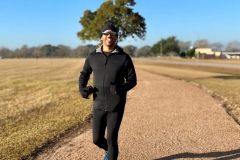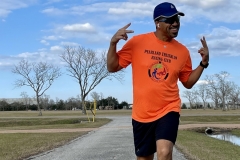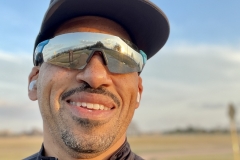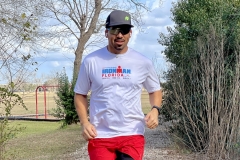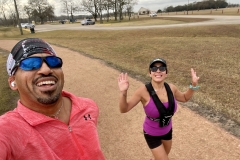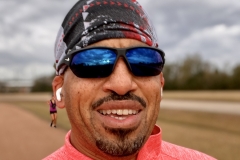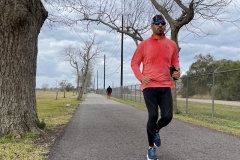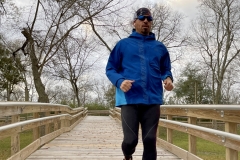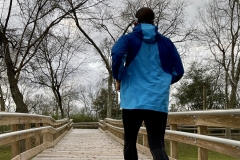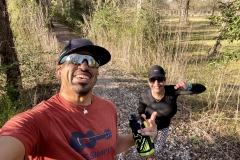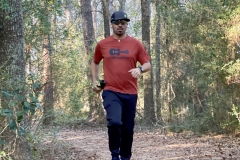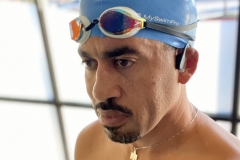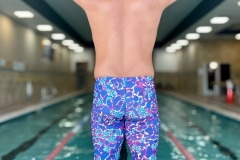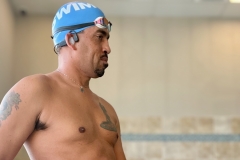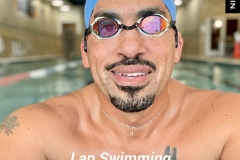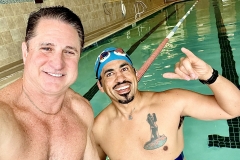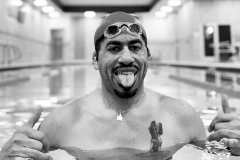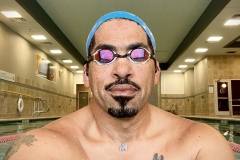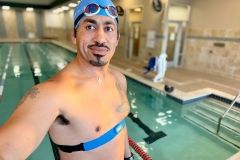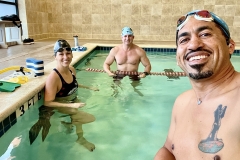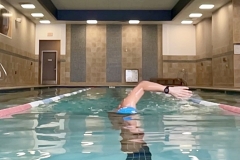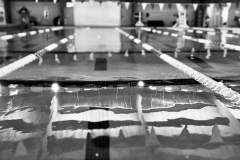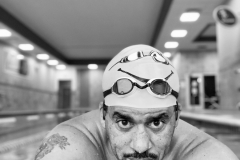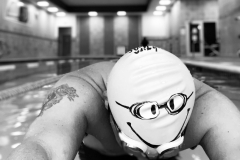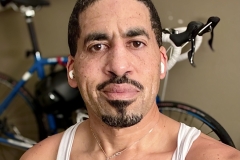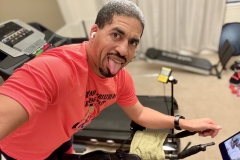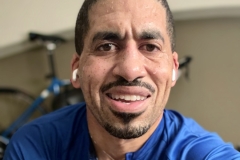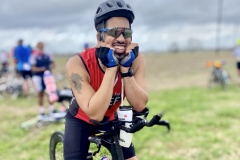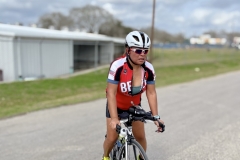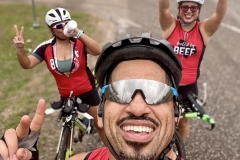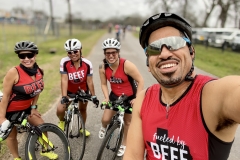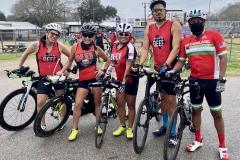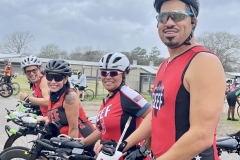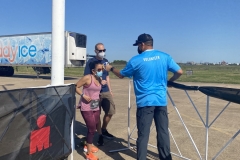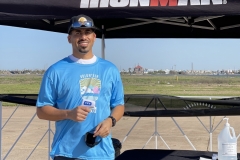TLDR:
I had prostate surgery in December of 2020 and I pushed myself hard to recover and regain my bodily functions. Five months later I had a personal best Olympic triathlon and completed a half Ironman. I’m feeling strong and preparing for Ironman Florida.
Roughly 12 months have passed since my surprise prostate cancer diagnosis, and 9 months since the prostatectomy. My recovery has progressed remarkably well. When I was discussing the possible side effects and quality of life impact prior to the procedure, I was lead to believe that I would be out of commission for quite a while and Ironman training would have to be postponed indefinitely. I was told to expect that my bladder and erectile functions may not be regained for up to a year or possibly longer. Several men shared that “I would never be how I used to be”, but that I’d be healthy and the rest of life would be good.
Accepting that I should expect to live with reduced bodily functions was a difficult pill to swallow. I didn’t want to live that way, so I decided that I wouldn’t visualize myself in that way. Instead, I continually visualized a future where I had all, or the majority of my normal bodily functions (ie, erectile function and urinary continence). After listening to the surgeon and post-op nurses I understood the importance of being disciplined with the post-surgical exercises would impact the extent of my recovery.
Tell me the rules so I know how to pay to win.
I completed an Ironman Triathlon less than a month before the surgery, so I knew all about the importance of discipline and consistency. Through training I learned that motivation is not the key to success, so don’t depend on it. Consistent practicing day after day is the “secret”. I kept that mindset and approached the post-operative recovery with the same level of discipline and sense of urgency – “today is my day” was my mantra.
Recovery is my responsibility
I began practicing the abdominal and pelvic floor exercises after I removed the catheter. My body was sensitive so I used a pregnancy cushion to protect my perineum as it healed. Kegel exercises were always on my mind. To regain bladder control they said to do them 3- 5 times daily. I thought, if that’s the minimum recommendation then I can do better! So I set an alarm on my phone to remind me to do them every hour, seven days a week. The alarm would display the word “SQUEEZE” on my screen 12 times a day. I did them.
For erectile function and penis health, I was given a very low dose PDE5 inhibitor (Cialis) and told to take them nightly before going to bed. The low dose form is not for erections but to facilitate blood flow. These medicines work by causing the muscles of blood vessels to relax (dilate) which allows increased blood flow. Men typically have several erections while they sleep which is the body’s way of keeping the penis healthy by cleaning out the tissue. Prostate surgery disturbs the nerves that normally control this process so it doesn’t happen reliably and scar tissue can build up in the penis causing long-term damage. I brushed my teeth and took my pills every night.
Staying active
Aside from regaining as much bladder and erectile function as possible, I wanted to continue training and racing Ironman triathlons. Ironman Texas 70.3 in late March and then Ironman Texas in mid-April were two that I still planned to complete. So, I had 4 months to get myself in race-ready condition.I came home with a catheter that I’d have worn for two weeks. So, rather than sit around and twiddle my thumbs, I found a way to keep my catheter bag secured to my leg so that I could take long walks (and maybe even jog). I began by walking 2-4 miles a day around my neighborhood. Once catheter-free, I increased the distance and my pace every couple of days. Initially, I walked as slow as a turtle and wore a diaper so the length of my walks was primarily limited to how much my diaper could hold. Although I had no bladder control, staying hydrated is critical so I drank a lot of water. Once I had the urge to pee, my window for finding a bathroom was 5 minutes at best. In addition to maintaining my physical conditioning, I desperately needed to develop a new set of muscles to regain bladder control…. Challenge accepted ✋🏽!
A few weeks after losing the catheter and feeling some sense of bladder control, I began going to the park where I typically did training runs. Instead of running, I would walk while Cruz ran. She would run ahead, then loop back and check on me, then run off again. After about two weeks of watching her run I couldn’t contain my desire to test my own abilities. I figured that I wouldn’t know if my body was ready unless I tested it.
Testing the limits is painful
The first attempt at running was very brief. After roughly six steps my body gave me immediate feedback – STOP THE DUMB SHIT NOW!! The pain was immediate and the consequences of that test lasted for several days. My wife was pissed, although she knew it was just a matter of time. I remained undeterred with a steely focus on my short-term goals. Ironman 70.3 Texas was getting closer every day and I was determined to complete the course one way or another. That race was to be a test of readiness for the full-distance race, Ironman Texas, three weeks later.After a week or two of slow walking, I attempted slow jogging again. With each attempt, I was able to go a little further before any pain or abdominal discomfort began. The progress was intoxicating. Based on the conversations with my surgeon and urologist before the surgery, I decided not to “get permission” to begin training again. The surgeon told me to stay out of the water for at least 4 weeks, but none could give me guidance on when was safe to commence training again. Listening to my body seemed the best choice, so that’s how I proceeded. Pushing a little harder each day and pulling back when I pushed too far was my approach. Slow-shuffle walking progressed to fast walking then slow, short distance jogging + walking, then jogging + occasional walking allowed me to build confidence and avoid injury or prolong my recovery.
Approximately four weeks after surgery I began swimming in a pool and was surprised at how painful it was. My abdomen was very tight from the scar tissue and adhesions, so freestyle was difficult. Initially, I used it as a way to gently stretch the scar tissue and loosen the adhesions. These were more recovery than actual training sessions. Soon, I became accustomed to the discomfort from stretching the scars and began swimming normally. Before I knew it, I was swimming and running – It was mid-January 2021, and I couldn’t wait to ride my bike again.I was afraid to ride my bike
Even six weeks post-surgery, sitting on a hard surface was uncomfortable. I tried just sitting on a stationary bike. Could I just sit on it for 5 minutes? Nope, nope, nope! Shit! The seats are too small and all of my weight is carried on my perineal area. I accepted that I wouldn’t be doing long rides anytime soon, so I continued swimming and pushing my limits running.
Rather than wait until I could go out and ride I decided to build my tolerance for the seat by simply sitting on my bike while it was on the trainer. Initially, I just sat there and watched my iPad until it was too uncomfortable (5-10 minutes). Progressing to pedaling (super easy stuff) happened within a week. I sat and spun my legs for 20 minutes, then 30, etc. until I could sit for an hour. Although the total time was an hour, I was getting off to use the bathroom every 10-20 minutes, so that served as a break from the discomfort.During the time of pushing my riding ability, I was also attempting to reduce my dependence on the adult diapers. I was not willing to become dependent on them. If I wasn’t wearing them, I had to attempt to hold my bladder or go to the restroom without leaking on myself. This approach, I believe, sped up my bladder control.
Going all in – shortening the recovery timeline
Once I was (fairly) comfortably riding on the trainer for an hour, I decided to take my bike outside. Lucy and I needed to feel the sun and wind again. Rather than go out alone, I met Cruz and she agreed to be my safety partner and ride slower initially. My distances were short, so when I finished, she would go ride on her own to complete her planned mileage.
The rides went well. Initially, They were uncomfortable as hell because triathlon bikes are very stiff and the rider feels all of the bumps in the road. I was happy that my legs and cardiovascular system were still strong. I hadn’t lost much fitness. I did have to stop a lot to pee, but I expected that.
Feeling confident, I decided to do a group ride in a nearby county – Pedaling the Prairie. I was going to attempt to ride 65 miles. After about 20 miles I realized that the 65-mile route would be a horrible idea, so I decided to detour and take the 40-mile route. Most of the others in my group completed the 65-mile ride about the same time I finished 40. I had a difficult time the last 5 miles, so I was happy with my choice not to be hardheaded.Still planning to complete the half-Ironman in late March, I decided to attend a local triathlon camp. I didn’t have expectations to crush the camp. Instead, I wanted to test my ability to endure the activities. I had a lot of difficulties doing the core exercises because my muscles were still weak. Doing activities that caused intense activation of my core muscles caused me to lose control of my bladder. I didn’t want to smell pissy all day, so I skipped most of that stuff. For three full days, I participated in all of the running & riding sessions with the rest of the group. I felt more fatigued than normal midway through the third day so I slowed down a bit. However, when I used the bathroom, I had some blood in my stool and urine. So I decided that my body was telling me that I’d done enough, it was time to stop. I felt physically capable of continuing but decided to pay attention to the signs. I felt good that I stuck it out as long as I did. The camp was fun and very difficult and I met some great athletes.
Not doing Ironman 70.3
Based on how my body responded to the demands of the triathlon camp, I decided not to do the Ironman 70.3 Texas race. I needed more recovery time. Disappointed, but pleased with my progress thus far, I chose to volunteer at the race. Since I wouldn’t be an athlete, I could spend the day serving those that were racing. I loved the experience and wrote about it in a separate post.
The next race on the calendar, Ironman Texas, was canceled because of a spike in COVID-19. I continued building my fitness and focused on the summer races, Captex Tri in May, Ironman 70.3 Lubbock in June. I prepared well and was happy with those performances. The race recaps are posted separately (CapTex &. Ironman Lubbock).Feeling much closer to normal
Since Ironman 70.3 Lubbock I’ve been in full training for Ironman Florida (Nov. 6). My bladder control is exponentially better and my erectile function is phenomenal. I am very happy with those aspects of my recovery. In fact, my urologist has been astounded at how quickly I’ve been able to get my body back online.
Never underestimate the determination of an Ironman athlete.
They all assumed that I was prepared to accept average or typical results. I wasn’t, nor have I ever been.
I list from my late grandmother Josephine, I keep a pee bottle an extra set of underwear and sweat pants in the back seat of my car in case I’m out and piss all over myself (I’ve had a few close calls). The hard work is paying off, diapers are no longer required for airplane trips!
Feelings of guilt
Finally, I’ve recently been experiencing feelings that I can best describe as recovery guilt. I don’t have guilt about recovering from surgery, instead, I feel guilty or unworthy of saying that I’m a “cancer survivor”. While I am a survivor, I was never close to death or even discussed the probability of dying. I didn’t endure chemotherapy or the effects of radiation or chemical castration. Comparative suffering is not a healthy thing, ones’ suffering does not negate or amplify another person’s experience. They are both valid and real. The feelings persist nonetheless. I suspect, like all emotions, they’ll fade with time.

